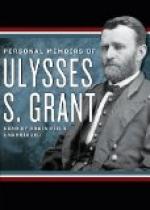The latter went into disuse many years ago. In fact it never had many soldiers in it, and was, I believe, finally sold.
(5) The Mexican war made three presidential candidates, Scott, Taylor and Pierce—and any number of aspirants for that high office. It made also governors of States, members of the cabinet, foreign ministers and other officers of high rank both in state and nation. The rebellion, which contained more war in a single day, at some critical periods, than the whole Mexican war in two years, has not been so fruitful of political results to those engaged on the Union side. On the other side, the side of the South, nearly every man who holds office of any sort whatever, either in the state or in the nation, was a Confederate soldier, but this is easily accounted for from the fact that the South was a military camp, and there were very few people of a suitable age to be in the army who were not in it.
(6) C. B. Lagow, the others not yet having joined me.
(7) NOTE.—Since writing this chapter I have received from Mrs. W. H. L. Wallace, widow of the gallant general who was killed in the first day’s fight on the field of Shiloh, a letter from General Lew. Wallace to him dated the morning of the 5th. At the date of this letter it was well known that the Confederates had troops out along the Mobile & Ohio railroad west of Crump’s landing and Pittsburg landing, and were also collecting near Shiloh. This letter shows that at that time General Lew. Wallace was making preparations for the emergency that might happen for the passing of reinforcements between Shiloh and his position, extending from Crump’s landing westward, and he sends it over the road running from Adamsville to the Pittsburg landing and Purdy road. These two roads intersect nearly a mile west of the crossing of the latter over Owl Creek, where our right rested. In this letter General Lew. Wallace advises General W. H. L. Wallace that he will send “to-morrow” (and his letter also says “April 5th,” which is the same day the letter was dated and which, therefore, must have been written on the 4th) some cavalry to report to him at his headquarters, and suggesting the propriety of General W. H. L. Wallace’s sending a company back with them for the purpose of having the cavalry at the two landings familiarize themselves with the road so that they could “act promptly in case of emergency as guides to and from the different camps.”
This modifies very materially what I have said, and what has been said by others, of the conduct of General Lew. Wallace at the battle of Shiloh. It shows that he naturally, with no more experience than he had at the time in the profession of arms, would take the particular road that he did start upon in the absence of orders to move by a different road.




